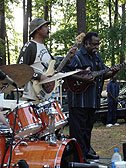The blues are ubiquitous. You may never have sat down to listen to all of B.B. King and Lucille's "Indianola Mississippi Seeds," and you may never have attempted to sell your soul to the devil (a la Robert Johnson), but if you've breathed, you know the blues. You've had your heart broken, lost a loved one, had financial woes or at least heard a little rock 'n' roll.
A newly formed organization in the area wants to capitalize on the blues that you and I have experienced. Carole Marble and Jesse Robinson got together to form the Central Mississippi Blues Society to unite the artists who create that pulse. Marble, the organizer and first president of the Indianola Blues Society, along with Robinson, who is a musician and commissioner on the Governor's Blues Commission, want to do everything they can to keep the blues alive and thriving.
Talking with Peggy Brown, spokeswoman for the society, I quickly discovered that though I was born and reared in Mississippi, I had a great deal to learn. In fact, it isn't unusual for young Mississippians to be unfamiliar with the genre, Brown says.
Brown explains that the Central Mississippi Blues Society has definite goals in mind. The first is to promote the blues and enhance the culture of blues music locally by educating the public and fostering an appreciation for the music's heritage. The organization also seeks to support, encourage and promote blues musicians and their craft. According to Brown, it isn't uncommon for musicians to move to places as far away as Iowa because they are unable to form fan bases there.
"Folks from other states love it and know more than the locals," Brown says. "In Mississippi, it doesn't seem to be cool to like (the blues) because of its rough history. It's (seen as) a part of history that people don't want to associate with."
Blues typically has a 12-bar chord progression, and it is based on a pentatonic scale. Historians have traced the art form's roots to African slaves, who initiated dialogue through call-and-response patterns. In the fields, the earliest version of the blues was the language of everyday life as a slave.
Despite these social roots, the blues remains a fiercely personal language, some-times lending itself to a jovial, raunchy mood. At other times, the mood can be melancholy or depressed. "Once (the blues is) in your soul, you can't get rid of it," Brown says.
The first step the Blues Society is taking toward supporting and encouraging home-grown talent is to sponsor the Central Mississippi Blues Review on Thursday, May 4. And for those who have got the blues and want to share it, the society's blues challenge approaches to offer the winner a chance at the International Blues Challenge.
The Central Mississippi Blues Review will be held May 4 at Hal & Mal's Red Room from 7 p.m.-1 a.m. Cost of admission is $5. For more info please visit the Central MS Blues website.



Comments
Use the comment form below to begin a discussion about this content.